Iowa State University
14-16 mai 2020
Iowa State University aura l’honneur d’accueillir la dixième édition de la Conférence Internationale Women in French, axée autour des marges et des marginalités.
Conférences plénières confirmées :
- Anne Donadey (San Diego State University)
- Claire Legendre (Université de Montréal)
Thème :
Le vingtième siècle, et en particulier sa seconde moitié, témoigne d’une présence accrue des femmes de lettres sur les scènes littéraires françaises et francophones. Chaque année voit désormais la publication de nombreux premiers romans par de jeunes auteures ou des ouvrages par des écrivaines confirmées. L’on pourrait donc aisément croire que les femmes de lettres sont enfin parvenues à la reconnaissance tant culturelle que populaire. Et pourtant… En 2014, la lycéenne Ariane Baillon lançait une pétition sur Change.org pour contester la présence d’une seule femme philosophe, Hannah Arendt, au programme du Baccalauréat. Deux ans plus tard, l’enseignante Françoise Cahen soumettait une requête similaire au Ministère de l’Éducation nationale, de l’Enseignement supérieur et de la Recherche pour inclure plus d’auteures au Bac L. Si, en 2018, celle-ci voit son vœu exaucé avec une épreuve exclusivement féminine (au programme : Madame de La Fayette, Madame de Staël et Colette), « sur les 51 textes présentés de 2003 à 2017, on compte… 3 signatures de femmes » (Brigaudeau). Il en va de même pour les prix littéraires : « Depuis la création du Goncourt . . . en 1903, les autrices françaises n’ont reçu que 159 prix sur les 740 récompenses décernées » (Orain et Dagorn). Enfin, Christine Planté et Audrey Lasserre nous rappellent que, en dépit de leurs contributions majeures à la littérature française, les écrivaines conservent une place presque insignifiante dans les manuels ou livres consacrés à l’histoire littéraire. Et que dire des auteures appartenant à ou représentant des perspectives minoritaires telles sexuelles ou ethnico-raciales ? Ces dernières subissent une double, voire triple invisibilisation. En dépit de leur grand nombre, les femmes de lettres, quel que soit leur contexte historique, demeurent ainsi encore marginales dans le paysage littéraire et la transmission de l’héritage culturel. Toutefois, comme l’exprime la féministe et philosophe afro-américaine bell hooks, les marges peuvent également incarner un puissant outil de conscientisation et de contestation. En effet, les auteures françaises et francophones ont contribué à la littérature d’expression française, et ce à n’importe quelle époque historique, des œuvres qui sont parmi les plus rebelles, originales ou politiques.
La conférence WIF 2020 propose d’examiner les voix et voies des marges et des marginalités à travers les siècles. Les propositions de communications pourront considérer les perspectives suivantes mais ne doivent en aucun cas s’y limiter :
Identités (individuelles, nationales, régionales, de genre, etc.)
Intersectionnalité (genre, classe, race, religion, etc.)
Discriminations, y compris les formes les moins discutées comme l’âgisme ou le capacitisme
Colonialisme et postcolonialisme
L’enseignement des marges au niveau universitaire
Précarité
Maladies (manies, obsessions ou dépendances)
Alternatives (perspectives, sociétés, féminismes, etc.)
Théorie des marges (queer, trans*, etc.)
Handicaps
Genres littéraires et cinématographiques
Place des femmes et autres perspectives sous-représentées dans la littérature ou le cinéma
Littératures et cinémas dits minoritaires
Empowerment
Rébellions
Paralittérature
Les rapports du (des) centre(s) avec la (les) marge(s)
Projet « One Book, One WIF » :
En partenariat avec nos collègues de WIF UK, Women In French participe au projet « One Book, One WIF ». Établi en 2017 par Stephanie Schechner, ce programme promeut l’étude d’auteures françaises ou francophones peu connues. L’auteure retenue pour la conférence de 2020 est Claire Legendre et son roman L’Écorchée vive (2009). Nous encourageons la soumission de propositions de communications ou de panels sur cette écrivaine.
Contributions :
Les propositions de communications ne doivent pas dépasser les 250 mots et doivent comprendre les coordonnées des intervenant.e.s ainsi qu’une notice bio-bibliographique (100 mots au maximum).
Les organisatrices encouragent la soumission de panels (3 intervant.e.s au minimum, 4 au maximum). Les propositions de panels doivent comprendre une explication de 250 mots ainsi que toutes les propositions individuelles.
Soumission :
Les propositions individuelles ou de panels peuvent être soumises au plus tard le 1er septembre 2019 via le site Internet de la conférence : http://www.wif2020conf.org
Calendrier :
1er septembre 2019 : soumission des propositions.
31 octobre 2019 : notification des acceptions ou refus.
30 novembre 2019 : date butoir pour confirmer (ou non) sa participation à la conférence.
15 décembre 2019 : date butoir pour régler les frais d’inscription à la conférence.
1er janvier 2020 : les intervenant.e.s sélectionné.e.s par le comité scientifique devront obligatoirement être membre de WIF avant le 1er janvier 2020 pour pouvoir participer à la conférence.
15 mars 2019 : Date butoir pour une demande de remboursement des frais d’inscription en cas d’annulation.
Ames et Iowa State University :
La ville d’Ames fut établie en 1864 afin de desservir, vers l’ouest, la voie de chemin de fer Cedar Rapids and Missouri River. Le président de la compagnie nomma la ville d’après un collègue également promoteur des chemins de fer, le Membre du Congrès Oakes Ames. Iowa State University, la première université “land-grant” des Etats-Unis, se situe à Ames. ISU s’est forgé une réputation de leader mondial dans diverses disciplines comme l’agriculture, le génie et la médecine vétérinaire. Avec plus de 35000 étudiant.e.s provenant de 130 pays différents, ISU possède une culture diversifiée et apporte un certain flair international au Midwest états-unien. Ames est facilement accessible par la terre et les airs. Ames se situe à environ 65 kilomètres (45 minutes) de l’aéroport International de Des Moines.
______________________________________________________________________________
10th International Women in French Conference
“Margins: Voices and Pathways”
Iowa State University
14-16 May 2020
Iowa State University is honored to host the 10th International Women in French Conference, focusing on margins and marginalities.
Confirmed Plenary Presentations:
- Anne Donadey (San Diego State University)
- Claire Legendre (Université de Montréal)
Theme:
The twentieth century, especially the second half, has witnessed a marked increase in the number of women authors on the French and francophone literary scene. Because of the significant increase in the publication of debut novels by young authors and books by established writers, it would be tempting to conclude that women authors have finally achieved widespread cultural and public recognition. Nevertheless, in 2014, a high-school student, Ariane Baillon, launched a petition onChange.org to challenge the fact that just one female philosopher, Hannah Arendt, was part of the Baccalauréat exam. Two years later, high-school teacher Françoise Cahen submitted a similar request to the Ministère de l’Éducation nationale, de l’Enseignement supérieur et de la Recherche to include more women authors in the Bac L exam. Although Madame de La Fayette, Madame de Staël and Colette were added to the program in 2018, “of the 51 texts included from 2003 to 2017, only three . . . were by women authors” (Brigaudeau). The same is true for literary awards: “Since the creation of the Goncourt . . . in 1903, French women authors have received only 159 of the 740 awards” (Orain and Dagorn). Finally, Christine Planté and Audrey Lasserre remind us that, despite their major contributions to French literature, women writers still do not occupy a prominent place in textbooks on literary history. Likewise, what can be said of authors from sexual or ethnoracial under-represented communities? These authors suffer the consequences of a double, or even triple invisibilization. Despite their large numbers and regardless of the historical time period, women authors are still marginalized in the literary world and in the transmission of cultural heritage. However, as posited by African-American feminist and philosopher bell hooks, being on the margins may constitute a powerful tool for creating awareness and protest. Indeed, women authors have written some of the most rebellious, original and political literature of French expression in all historical eras.
The 2020 WIF Conference will examine voices and pathways from the margins, as well as diverse forms of marginality from all eras. Possible topics include; but are not limited to:
Identities (individual, national, regional, gender, etc.)
Intersectionality (gender, class, race, religion, etc.)
Discrimination, including under-represented forms such as ageism or ableism
Colonialism and Postcolonialism
Approaches to teaching the issue of marginality at the university level
Destitution
Illness (including mania, obsession, addiction)
Alternatives (perspectives, societies, feminisms, etc.)
Theories of the margins (queer, trans*, etc.)
Disabilities
Literary and cinematographic genres
Place of under-represented women and perspectives in literature or film
“Minority” literature and film
Empowerment
Rebellions
Paraliterature
Relationship between the center(s) and the margin(s)
“One Book, One WIF” Initiative:
In partnership with our colleagues from WIF UK, Women in French is continuing the “One Book, One WIF” initiative. Established in 2017 by Stephanie Schechner, this project aims to promote critical interest in lesser known French and francophone women writers. The book selected for the 2020 WIF conference is Claire Legendre’s novel L’Écorchée vive (2009). Proposals for papers or panels on this author are encouraged.
Proposals:
Individual abstracts should not exceed 250 words and should include the presenter’s contact information as well as a short biography (100 words maximum). Proposals for three- or four-paper panels are also encouraged. Panel proposals should include a 250-word rationale for the proposed topic as well as individual abstracts.
Submissions:
Individual abstracts or panel proposals must be submitted no later than September 1, 2019 via the conference website: http://www.wif2020conf.org.
Calendar:
September 1, 2019: Submission of proposals.
October 31, 2019: Notification of acceptance or refusal.
November 30, 2019: deadline to confirm conference participation.
December 15, 2019: deadline to register for the conference.
January 1, 2020: Participants must be members of WIF by January 1, 2020 to participate in the conference.
March 15, 2019: Deadline for reimbursement of the registration fee due to cancellation.
Ames and Iowa State University:
Ames was established in 1864 to serve the westward-bound Cedar Rapids and Missouri River Railroad. The president of the railroad named the town after fellow rail promoter, Congressman Oakes Ames. Ames is the home to Iowa State University, the nation’s first land-grant university. Iowa State has established itself as a world leader in diverse disciplines such as agriculture, engineering, and veterinary medicine. With more than 35,000 students hailing from nearly 130 different nations, Iowa State offers cultural diversity and brings a distinct international flavor to the Midwest. Ames is easily accessible by ground and air transportation. Ames is 40 miles (45 minutes) from the Des Moines International Airport.
Organisatrices/Organizers:
Dr. Michèle A. Schaal (Iowa State University) mschaal@iastate.edu
Dr. Arline Cravens (Saint Louis University) arline.cravens@slu.edu
Dr. Susan Ireland (Grinnell College) ireland@grinnell.edu
Comité scientifique/Selection Committee:
Arline Cravens (Saint Louis University), Susan Ireland (Grinnell University), E. Nicole Meyer (Augusta University), Patrice J. Proulx (University of Nebraska Omaha), Michèle A. Schaal (Iowa State University)
Bibliographie/References:
Baillon, Ariane. « Benoît Hamon: Donnez une place aux femmes dans les programmes scolaires. » Change.org août 2014. Web. 30 août 2018 <https://www.change.org/p/beno%C3%AEt-hamon-donnez-une-place-aux-femmes-d....
Brigaudeau, Christel. « Colette, Madame de Staël… un bac français 2018 très féminin. » Le Parisien.fr 18 juin 2018. Web. 30 août 2018 <http://www.leparisien.fr/societe/colette-madame-de-stael-un-bac-francais....
Cahen, Françoise. « Pour donner leur place aux femmes dans les programmes de littérature au bac L. » Change.org mai 2016. Web. 30 août 2018 <https://www.change.org/p/najatvb-donnez-leur-place-aux-femmes-dans-les-p....
hooks, bell. Feminist Theory: From Margin to Center. 1984. New York : South End Press, 2000.
Lasserre, Audrey. « Les Femmes du XXe siècle ont-elles une histoire littéraire ? » Cahier du CERACC.4 (2010) : 1-18.
Orain, Grégoire, et Gary Dagorn. « Combien de femmes parmi les prix littéraires français ? » Le Monde.fr 24 nov. 2017. Web. 30 août 2018 <https://www.lemonde.fr/les-decodeurs/article/2015/11/03/les-prix-littera....
Planté, Christine. « La Place des femmes dans l’histoire littéraire : Annexe ou point de départ d’une relecture ? » Revue d’histoire littéraire de la France 103.3 (2003): 655-68.




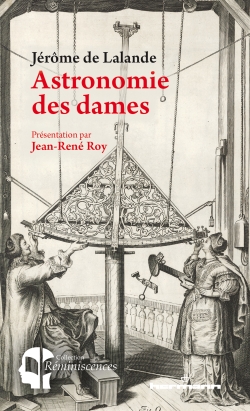 Jérôme De Lalande, Astronomie des dames, présentation par Jean-René Roy, Paris, Hermann, 2022.
Jérôme De Lalande, Astronomie des dames, présentation par Jean-René Roy, Paris, Hermann, 2022.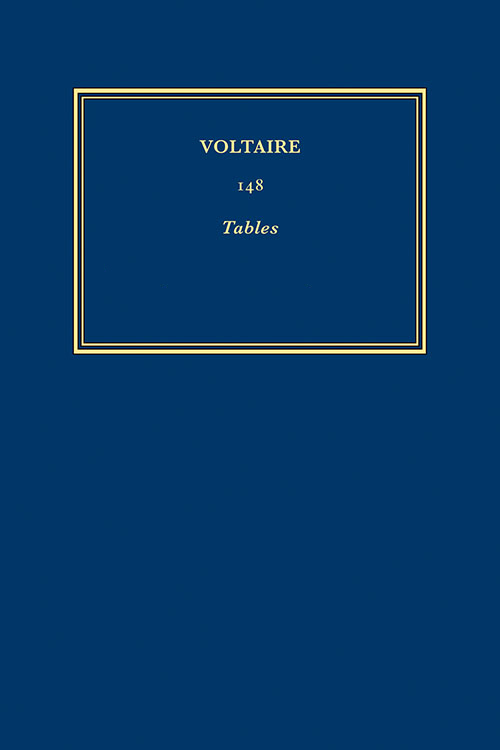 Voltaire, Œuvres complètes, t. 148, éd. Alison Oliver & Gillian Pink, University of Oxford, coll. "Œuvres complètes de Voltaire", 2022.
Voltaire, Œuvres complètes, t. 148, éd. Alison Oliver & Gillian Pink, University of Oxford, coll. "Œuvres complètes de Voltaire", 2022.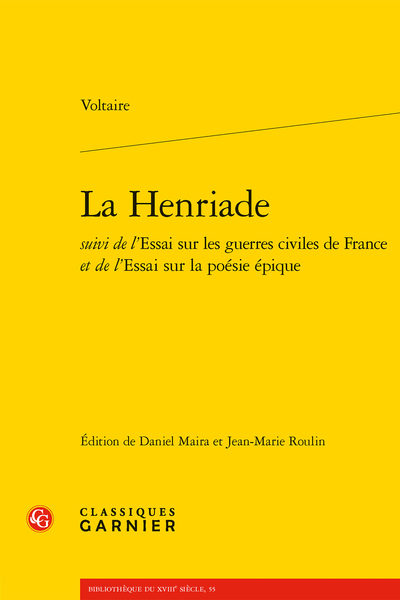 Voltaire, La Henriade suivi de l'Essai sur les guerres civiles de France et de l'Essai sur la poésie épique, éd. Daniel Maira & Jean-Marie Roulin, Paris, Classiques Garnier, 2022.
Voltaire, La Henriade suivi de l'Essai sur les guerres civiles de France et de l'Essai sur la poésie épique, éd. Daniel Maira & Jean-Marie Roulin, Paris, Classiques Garnier, 2022.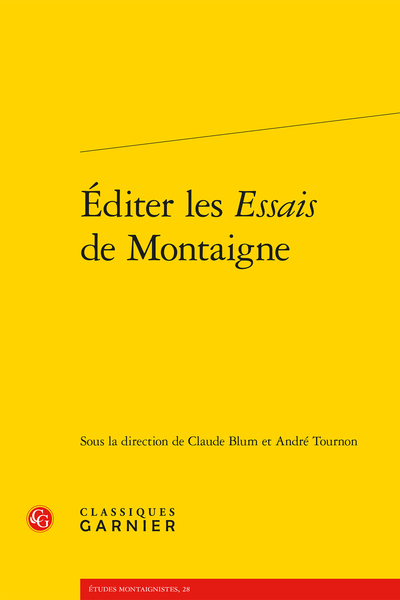 Claude Blum et André Tournon (dir.), Éditer les Essais de Montaigne, Paris, Classiques Garnier, (1987) 2022.
Claude Blum et André Tournon (dir.), Éditer les Essais de Montaigne, Paris, Classiques Garnier, (1987) 2022.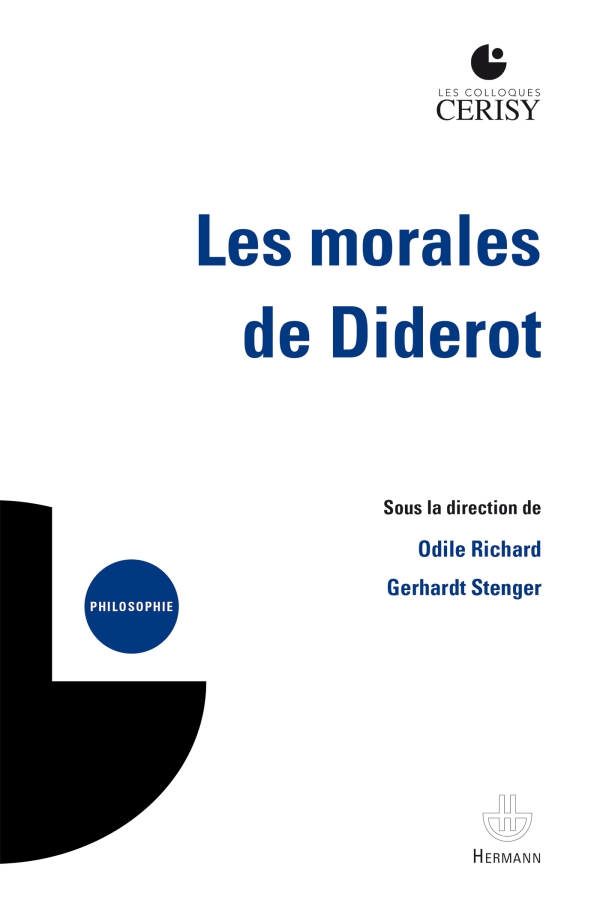 Odile Richard, Gerhardt Stenger (dir.), Les morales de Diderot, Paris, Hermann, coll. "Colloques de Cerisy", 2022.
Odile Richard, Gerhardt Stenger (dir.), Les morales de Diderot, Paris, Hermann, coll. "Colloques de Cerisy", 2022.